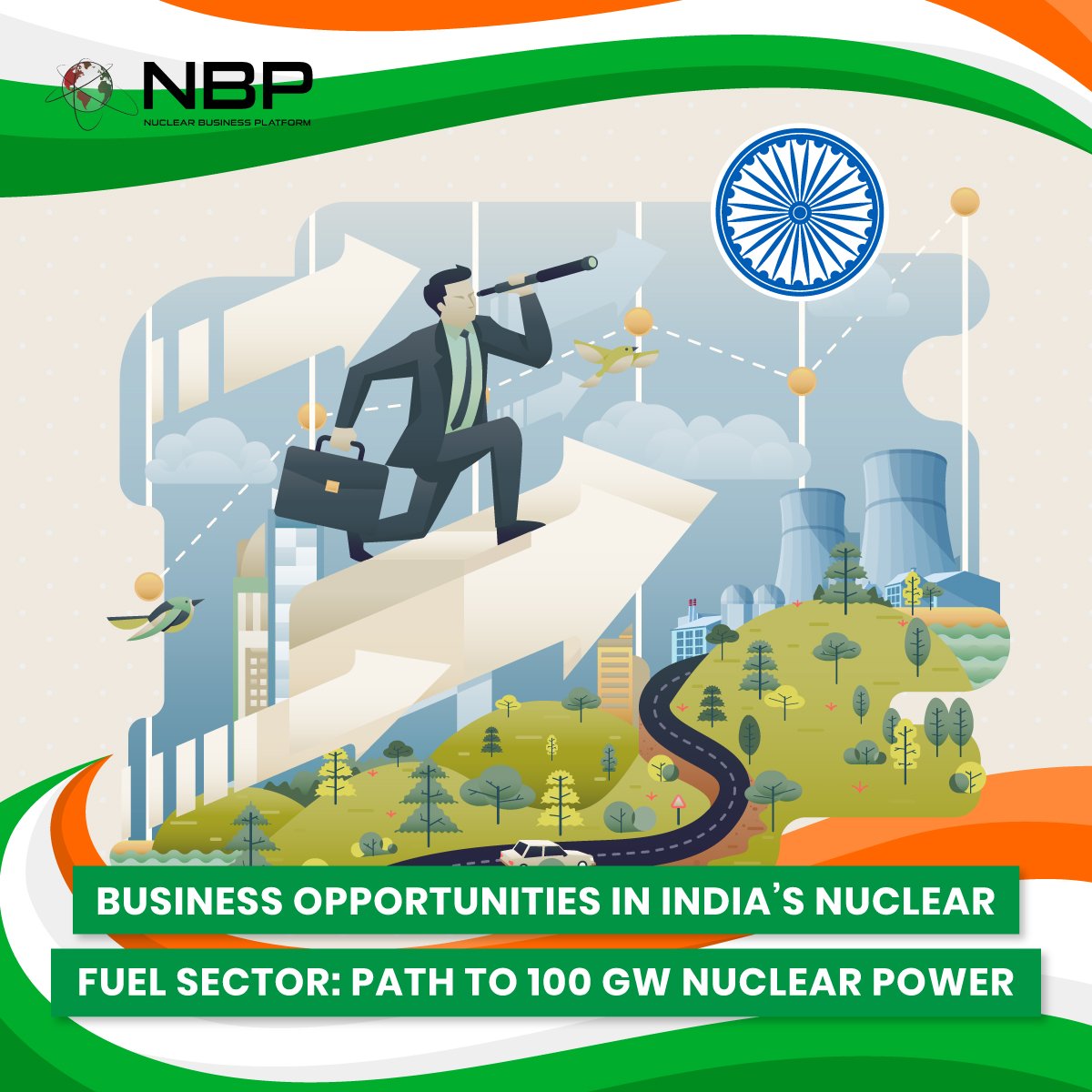Business Opportunities in India’s Nuclear Fuel Sector: Path to 100 GW Nuclear Power
India's nuclear energy ambitions are significant, aiming for 100 GW of nuclear power by 2047. Currently, the country has an installed capacity of 8.18 GWe from 24 operational reactors. Plans are underway to expand this capacity to 22.48 GWe by 2031 through the completion of ongoing and sanctioned projects. The projected surge in nuclear capacity directly correlates with an increasing demand for nuclear fuel. As India moves forward with its ambitious energy targets, it will need a consistent and substantial supply of uranium, thorium, and advanced fuels to meet the operational needs of both existing and upcoming nuclear reactors. This escalating demand has intensified the country's focus on securing international nuclear fuel agreements and developing its domestic supply chain, positioning the nuclear fuel sector as a critical component of India's energy transition.
Domestic Nuclear Fuel Resources and Potential
India has identified 4,23,222 tonnes of uranium oxide resources across 47 deposits, primarily in Andhra Pradesh, Jharkhand, and Telangana, though low-grade quality makes extraction less economical. Pressurised Heavy Water Reactors (PHWRs), the backbone of India's nuclear power generation, depend on a consistent uranium fuel supply to sustain operations. Additionally, India has significant thorium reserves, estimated at 11.93 million tonnes of in-situ resources of monazite, mainly in Kerala, Tamil Nadu, and Odisha, positioning thorium as a potential key fuel in India’s three-stage nuclear program.
Despite having substantial nuclear fuel resources, India faces several challenges in optimizing its nuclear fuel supply chain. Low-grade uranium ores, environmental concerns, and geological constraints cause delays in mining projects. Investments in advanced mining technology, processing, and waste management are essential to address the issues.
Key Global Nuclear Fuel Suppliers and Agreements
India has steadily expanded its uranium imports through various international agreements, particularly following the 2008 IAEA safeguards, the NSG resolution, and US Congress approval. In December 2008, Russia and France secured contracts to supply uranium, with Kazakhstan, Brazil, and South Africa also preparing to provide uranium.
India further diversified its uranium imports by signing long-term deals with other countries. In 2019, India and Uzbekistan signed an agreement. Additionally, agreements were made with Namibia, Mongolia (2009), Australia (2014), and Canada (2013).
Innovations in Nuclear Fuel Technology
India's commitment to advancing nuclear fuel technology is reflected in its research and development initiatives, which enhance energy efficiency and create new market opportunities for nuclear fuel companies.
Prototype Fast Breeder Reactor (PFBR): Located in Kalpakkam, Tamil Nadu, the 500-MWe PFBR utilizes mixed oxide (MOX) fuel, which consists of plutonium-239 and uranium-238. This reactor is a pivotal in India’s three-stage nuclear power program, designed to harness India’s large thorium reserves for energy production.
Advanced Nuclear Energy for Enriched Life (ANEEL): The ANEEL fuel combines thorium with High Assay Low Enriched Uranium (HALEU), improving reactor safety and efficiency while minimizing long-lived radioactive waste. This innovation aligns with India’s long-term energy goals and can be integrated into existing Pressurized Heavy-Water Reactors (PHWRs).
Small Modular Reactors (SMRs): SMRs present a flexible and safer alternative to traditional large reactors. India's interest in deploying these reactors, which can use low-enriched uranium (LEU) or HALEU. The 2024-25 budget includes plans to develop Bharat Small Reactors, recognizing nuclear energy's essential role in the future energy mix with the installation of 40-50 units.
Pressurized Heavy Water Reactors (PHWRs): Ongoing investment in PHWR technology, which uses natural uranium as fuel, reinforces India's commitment to scaling up its nuclear power capacity. PHWRs remain central to India's nuclear energy strategy, increasing the demand for uranium.
Investment Opportunities in India’s Nuclear Fuel Market
India's nuclear energy expansion offers numerous opportunities for companies and investors entering the nuclear fuel market. The country’s reliance on both domestic and international fuel sources provides growth potential in several key areas such as:
Fuel Supply Partnerships: Ongoing agreements with countries like Russia, the US, France, and Kazakhstan create avenues for expanding partnerships, enhancing the presence of nuclear fuel suppliers in India.
Infrastructure Development: Upgrading mining and processing facilities, along with the need for advanced technology and waste management solutions, presents significant investment potential for sustainable nuclear fuel infrastructure.
Technology and Innovation: Companies specializing in, natural and enriched uranium fuel, thorium fuel and Mixed Oxide (MOX) fuel can capitalize on the growing demand for advanced nuclear fuel solutions in India.
Fuel reprocessing Technology: Reprocessing spent nuclear fuel enables the recovery of valuable materials, such as plutonium and uranium, which can be recycled into new fuel. This initiative can catalyse investment in advanced technologies and infrastructure while fostering partnerships with global players.
Local Manufacturing and Supply Chain Development: Investing in local manufacturing for nuclear fuel components offers a significant opportunity by establishing production facilities for essential components and form strategic partnerships with local firms to strengthen the supply chain.
India’s focus on optimizing domestic resources and forging international collaborations ensures a reliable nuclear fuel supply, positioning India as an emerging player in the global market. The recent allocation of USD 270 million in the 2024-25 Union Budget to nuclear power projects—including USD 81.85 million for the Fuel Cycle Facility and USD 93.27 million for Nuclear Fuel Fabrication Projects—underscores the government’s dedication to enhancing its nuclear fuel supply chain. These strategic investments and innovations in fuel technology create substantial business opportunities, making India's nuclear sector an attractive arena for investors looking to capitalize on the country’s transformative energy journey.
The 5th edition of India Nuclear Business Platform (INBP) will take place in Mumbai this 19-20 November 2024. The industry meeting will feature all the officials and players across the Indian nuclear supply chain. For more information on this meeting including exhibition opportunities, click here



